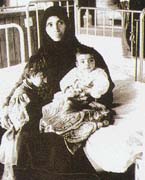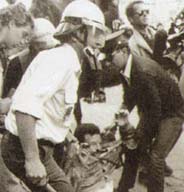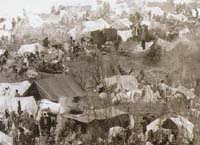
|
|
Poverty is a complex, multi-dimensional problem that casts long shadows over many areas of existence in terms of population health, environment and education, and can be seen as a threat to the long term viability of structured stable societies. Many of the major problems affecting the world today can be seen to have their roots in poverty. For instance, the rising tide of terrorism throughout the world can be seen as an expression of hopelessness by the world's disenfranchised, as they see themselves become poorer through a lack of education, unemployment, drug abuse and homelessness.
One way to construct such a set of guiding principles would be to base them around one of the five pillars of Islamic faith, the concept of "Zakah", which is in effect a tax on a person's wealth in excess of what is needed for sustenance, to aid those in society who are less fortunate. While being highly codified, it is as a concept, far more flexible than the Christian concept of charity. It can be used in a number of ways; the giving of alms, for the upkeep of the poor, for travellers in need, those serving the cause of Islam, for benevolent works and the maintenance of those who disburse the fund. "Zakah" can be made as a contribution in kind whose minimum schedule is called "nisbah". On liquid assets, as gold, silver, merchandise, financial instruments and stocks and bonds, the 'nisbah' is 2.5 per cent of the value of that which has been held for one year. Based on this principle it would be possible, were the international community to agree, to establish a fund that would directly address poverty throughout the world. It would be administered by an executive committee from all contributing countries, who would establish a series of principles and objectives with which to work, and whose mandate would be to ensure that all it's donations and awards would directly benefit those to whom they are given. It would be the duty of the committee to ensure that all costs for administration would not exceed a small percentage of the fund itself - say one or two per cent. Assuming a willingness on the part of the international community to accept a radical rethinking of the way it goes about aiding the third world and addressing global problems such as poverty, disease, and illiteracy, how would countries be able to contribute to such a fund in a way that would not affect spending on their own social programmes? One answer would be to levy a "nisbah" of 2.5 per cent of all a country's military spending. Currently nearly all governments in the world spend over three per cent of the revenue they raise through taxes on military expenditure, so levying a "nisbah" on this expenditure would seem a very reasonable way of raising very large sums of money annually to address the needs of the world's poor, help repair environmental damage and address other major problems affecting people throughout the world, such as drug abuse, unemployment, and housing. Indeed, stable, well fed populations very rarely embrace violence or extremist causes.
If all countries were to contribute in the same way, the fund would become one of the largest financial resources in the world, easily able to address poverty on a global scale. Thus enabling help to be given to all countries societies and peoples regardless of nationality, race or religion.
|
Khalaf A. Al Habtoor
|

 Entire blocks in the Bronx, Brooklyn and Harlem in New York City look as if they have been under aerial bombardment. Tens of thousands sleep in the cemeteries in Cairo, and in Bombay the "pavement" dwellers number in their millions.
Such vignettes depicting the poor of the world's mega-cities, those with populations of over 10 million, are so powerful and so widely circulated that it is easy to forget that on a global scale, poverty is a rural problem. Poor countries are agrarian countries. Poor people are predominantly rural people. United Nations reports show that in the world's poorest countries more than 75 per cent of the population lives in rural areas.
Entire blocks in the Bronx, Brooklyn and Harlem in New York City look as if they have been under aerial bombardment. Tens of thousands sleep in the cemeteries in Cairo, and in Bombay the "pavement" dwellers number in their millions.
Such vignettes depicting the poor of the world's mega-cities, those with populations of over 10 million, are so powerful and so widely circulated that it is easy to forget that on a global scale, poverty is a rural problem. Poor countries are agrarian countries. Poor people are predominantly rural people. United Nations reports show that in the world's poorest countries more than 75 per cent of the population lives in rural areas. While the international community recognises the problem, and the United Nations attempts to do what it can through it's various agencies to alleviate it, there has been a failure to stem the tide of world poverty. This is because there is no mechanism to address the fundamental needs of the world's poor. What is needed, is a set of guiding principles from which nations can construct a set of objectives to eradicate poverty in all its forms. For if we do nothing, the future for our children will be bleak.
While the international community recognises the problem, and the United Nations attempts to do what it can through it's various agencies to alleviate it, there has been a failure to stem the tide of world poverty. This is because there is no mechanism to address the fundamental needs of the world's poor. What is needed, is a set of guiding principles from which nations can construct a set of objectives to eradicate poverty in all its forms. For if we do nothing, the future for our children will be bleak. To give an example, 2.5 per cent of the United States annual defence budget would contribute US$ 6.9 billion to a 'Zakah' fund. This should be possible without jeopardizing the United States ability to fulfill it's military commitments at home and overseas, add another 2.5 per cent of the defence budgets of the countries that make up the European Union, US$ 3 billion, could, by themselves make an annual contribution of US$ 9 billion to such a fund. Indeed, it can be argued, that by contributing 2.5 per cent of global defence expenditure to a global fund to alleviate poverty, would in the long term, reduce the need to spend so much of the world's wealth on armed forces, as contented people, living in secure communities, generally do not feel the need to resort to crime and violence to obtain the means for survival for themselves or their families.
To give an example, 2.5 per cent of the United States annual defence budget would contribute US$ 6.9 billion to a 'Zakah' fund. This should be possible without jeopardizing the United States ability to fulfill it's military commitments at home and overseas, add another 2.5 per cent of the defence budgets of the countries that make up the European Union, US$ 3 billion, could, by themselves make an annual contribution of US$ 9 billion to such a fund. Indeed, it can be argued, that by contributing 2.5 per cent of global defence expenditure to a global fund to alleviate poverty, would in the long term, reduce the need to spend so much of the world's wealth on armed forces, as contented people, living in secure communities, generally do not feel the need to resort to crime and violence to obtain the means for survival for themselves or their families.